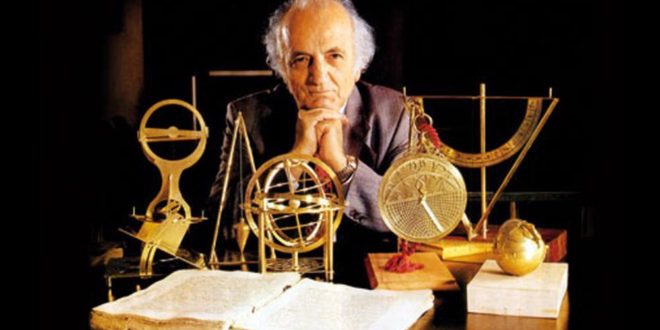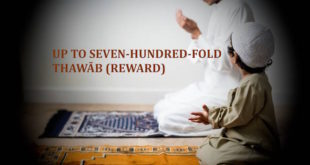Fuat Sezgin (October 24, 1924 – June 30, 2018) is a Turkish Islamic scholar who lived in the end of the 20-th century and in the first quarter of the 21-st century.
He was the founder and honorary director of the Institute of Arab Islamic History named after Johann Wolfgang Goethe, and was an outstanding professor at the German University of Goethe in Frankfurt.
Fuat Sezgin received his doctorate in 1950 at the University of Istanbul. His thesis was called “Sources, on which settled al-Bukhari,” that was against the beliefs and opinions of Western orientalists. It is well known that al-Bukhari collected written sources and oral words of witnesses, dating from the 7-th century.
When Sezgin was 36 years old, he was a professor at Istanbul University, but could not continue his work because of political and social unrest in the country. In 1961, he began his career as a professor at Frankfurt University in Germany. In 1965 he was appointed the professor at the same university. Professor’s research here is focused on the golden era of Islam. In 1982 Fuat Sezgin managed to create the Arab Institute of Oriental Studies. At present, this institute has collected almost all the most complete scientific texts and collections and bibliographic information on the history of Arabic and Islamic science in the world. In 1983, Fuat Sezgin created a unique museum called “Islamic Science and Technology” in his institution.
He gathered in this museum historical artifacts about the history of the Eastern peoples, as well as scientific equipment and maps belonging to Islamic scholars of the world. A similar museum was built in Istanbul in 2008. All exhibits and scientific maps in these museums are more than 800 pieces.
He is the author of many scientific books and articles. The 13-volume collection of Arabic-Islamic sciences was published in 1967-2000 by Fuad Sezgin in his magazine “Arab-Islamic History”, whose editor he was. Also, a collection of works, a five-volume book on the natural history of Islamic science – is a bioliographic scientific set of documents that are the fundamental foundation of the Museum of Islamic Science and Technology in Frankfurt, created by Fuat Sezgin.
Fouad Sezgin notes that, based on documents and maps of 1420 and on their special signs and notes left by Muslim sailors, it can be asserted that they conquered the North and South America much earlier than Columbus.
Fuat Sezgin received many popular and prestigious awards for his services, including the King Faisal International Royal Prize in 1978, for his studies of Islamic science. This international prize is at the level of the Nobel Prize. Very recently, alike the same prize was given to the President of the Russian Federation V. Putin and to the President of the Republic of Tatarstan M. Shaimiev.
He was also awarded by the Order of Merit in the Federal Republic of Germany. He is a member of the Academy of Sciences of Turkey. Fuad Sezgin is also a member of the Royal Academy of Morocco, as well as a member of the academies of Cairo, Damascus and Baghdad.
On September 24, 2012 the Ankara mayor’s office gave Fuat Sezgin’s name to one of the city’s square. The grand opening of which was open-air and was attended by Fuat Sezgin and his wife Ursula.
The works published by Fuat Sezgin can be summarized as follows. These include: Islamic geography, Islamic medicine, the achievements of Islamic scholars in mathematics and astronomy, in music, Islamic philosophy, works on natural science in Islam, Islamic numismatics, arithmetic figures in the Islamic world, Islamic architecture, history and classification of sciences in Islam and other scientific publications, etc.
From the above, it is well known that the scientist sought to classify the treasures of knowledge established by the Islamic world, specifically based on realities.
One of the aspects of Fuat Sezgin’s creativity is his scientific discovery – “Sources, on which settled al-Bukhari”. It is obvious that this book by Professor Fuad Sezgin about Imam Bukhari corrects many common and misconceptions in the study of «Al-Jami as-saheeh». At the same time, this study will help to identify the written sources that Imam Bukhari had.
Fuat Sezgin, as the author of this work, illustrates the methodology of estimating historical sources.
In our opinion, one of the outstanding merits of Fuat Sezgin is that he was one of the first, who show to Islamic-Arabic and Eastern countries and to the world a history of systematic research. He performed this tremendous work strictly in chronological order and systematized all the structural studies.
Professor Fuad Sezgin, speaking of the philosophy of Islam, will bring information about Abu Nasr al-Farabi, which consist of sixteen printed pages, and include the names of all Western thinkers. Here, we can see the following works of Al-Farabi, for example:
“Risola phi phasylatil al-ulum wa sinoate.” – رسالة فى فضيلة العلم وسناءة
(A book about the peculiarities of science)
“Risola phi Masail Mutafarriya”. – رسال مسائل المتفرقة
(Book about problem solving)
“Risola fi isbat al-mufarriat, at-taliata.” كتاب في إثبات المفارقات التعليقات – (A book about the confirmation of unexpected phenomena)
“Kitab at-tanbi ala sabil al-sada” – كتاب التنبيه على سبيل السعادة
(The book is about vigilance to happiness.)
“Kitab tásil as-sada”. – كتاب تهسيل السعادة
(A book about the tears of happiness.)
“Kitab as-siyasat al-madanya” .- كتاب السياسة المدنية
(The book about the cultural policy.) And besides this “Sharҳ Risalat Zinun al-Kabir al-junani” – شرح رسالة ذنون الكبر الينينى
(The book about the review of “Zunun al-Kabir Al-Yunaniy”), etc.
In addition, Abu Nasr al-Farabi has books about music, such as “Kitab al musika al-kabir”, “Kitab ihsa al-iqaat”. These books contain a lot of important information about music that have been concentrated for a long time. These important achievements of Islamic science were translated into Latin and became the property of the whole of Europe. And from time immemorial they were used by them in their real life. This is exactly what Fuat Sezgin writes about in his documentary research.
Fuat Sezgin also writes about the philosophical worldviews of Avicenna, in particular, he collects information about him, which consists of more than 20 printed sheets. He speaks of Avicenna as an outstanding historical figure and his unthinkable contributions to the world medical science. Speaking of him, he will bring numerous facts that can not be denied. He will give examples from the number of scientific works of Avicenna, for example:
Risala phi at-tabiat min uyun al-hikma. – رسالة في الطبيعة من عيون الحكمة
(A book about nature that consists of springs of wisdom.)
Risala fi al-azhram al-ulviya – رسالة في الأجرام العلوية
(The book on higher physical bodies (ajram)
Risola fi al-қuva al-insania wah-idrakiya – رسالة في القوة الانسانية و الادراكية
(A book about the mind and memory of a person.)
Risala fi al-udud. – رسالة في الحدود
(The book about the garrits and territories)
Risala fi alas al-ulum al-alylia. – رسالة في اقسام العلوم الاقلية
(A book on the parts of the intellect.)
Risala fi bibat al-nubuvat wa tawil rumuzi wa wa amsalihim. –
رسالة في اثبات النبواة و تعويل رموزهم و امثالهم
(The Book of the Signs of the Prophet and the examples.)
Ar-Risala al-nairuziya phi maanii al-ҳuruf al-ҳijaiya. –
الرسالة النوروزية في معاني الحروف الهجائية
(A book on the meaning of individual letters.)
Risala fil al-ad. –
الرسالة في العهد
(The Book of Promises.)
Risala fi al-ilm al-ahlaq. –
الرسالة في العلم الاخلاق
(A book about the science of morality.)
Mantiq al-Masrijqin. –
منطق المشرقين
(The book on Eastern logic)
I would like to note, human life has it’s limit, but the works created by him do not have such limits. The works that written by Fuat Sezgin serve to the humanity for a long time.
Science Foundation of Fuat Sezgin: “History of Science and Technology in Islam” will worked for the benefit of young scientists of different nations and for the benefit of nation progress.
References:
The Tables of al-Khwarizmi and the Tabulae Tolentanae. Texts and Studies. Collected and Reprinted. Ed. F. Sezgin. 355pp, 2007. (Historiography and Classification of Science in Islam.)
- Camerarius (Ed.): Alpharabii, vetustissimi Aristotelis interpretis opera omnia, quae, latina linguâ conscripta, reperiri potuerunt. (1638)
- G. Farmer. Al Farabis Arabic-Latin writings on Music.(1934)
Efros: Palquera’s Reshit Hokmah and Alfarabi’s Ihsâ’ al ‘ulum. (1935)
 Imom Buxoriy xalqaro ilmiy-tadqiqot markazi bukhari.uz
Imom Buxoriy xalqaro ilmiy-tadqiqot markazi bukhari.uz















